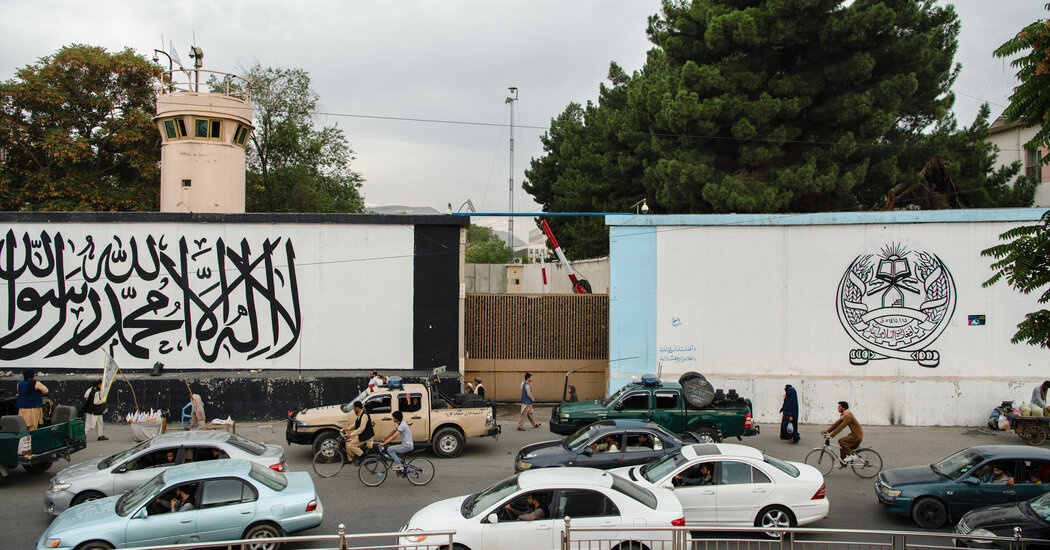In one of its final acts, the Biden administration secured the release of two Americans held in Afghanistan in a prisoner swap for a Taliban member imprisoned in the United States on narcotics charges.
The Taliban government freed Ryan Corbett and William Wallace McKenty in exchange for Khan Mohammed, who was released from a U.S. federal prison.
Mr. Biden issued a conditional commutation to Mr. Mohammed before he left office, though officials did not disclose the order until Mr. McKenty and Mr. Corbett were free.
Mr. Corbett’s case had received public attention. Earlier this month, his wife, Anna, visited with Donald J. Trump in Mar-a-Lago and had a call with President Joseph R. Biden Jr.
Mr. Corbett, 42, had long lived in Afghanistan until the fall of the U.S.-backed government in 2021. He had returned to the country to help the microlending and consulting business he had created when he was taken captive in the country’s north.
Far less was known about Mr. McKenty, 69, whose family had asked the U.S. government to keep his identity private.
Two other American captives remain in Afghanistan. George Glezmann, a former airline mechanic, and Mahmood Habibi, a naturalized American, who was seized soon after a U.S. strike in Afghanistan killed Ayman al-Zawahri, the leader of Al Qaeda.
In a statement, members of Mr. Corbett’s family praised both the Trump administration and the Biden administration for making the exchange. But they expressed regret Mr. Glezmann and Mr. Habibi were also not freed.
“It was our hope that Ryan, George and Mahmoud would be returned to their families together, and we cannot imagine the pain that our good fortune will bring them,” the statement said.
Biden officials wanted Mr. Glezmann and Mr. Habibi to be included in a trade and were disappointed when they were not, two former senior officials said. But the administration did not want to pass up the chance to bring home the two other men, one of the officials said. Biden officials had made multiple proposals to the Taliban to secure all the hostages, but those offers were rejected. Mr. Habibi’s whereabouts remain unknown, and the Taliban have claimed they did not know what happened to him.
Qatar helped negotiate the final deal and provided logistical support for the exchange, according to one of the former officials.
In all, the Biden administration secured the release of more than 80 hostages and other wrongfully detained people around the world, officials said.
Mr. Mohammed was convicted in 2008 and was one of several people whom the Taliban government wanted freed.
During his trial, Mr. Mohammed was accused of helping the Taliban obtain rockets to attack an U.S. military base in Afghanistan and selling heroin intended for distribution in the United States.
He was indicted in 2006, then brought to the United States in 2007 for trial and ultimately to serve his prison sentence.
The deal to free the two Americans, reached in the past week, did not include the release of Muhammad Rahim, an Afghan who has been held at Guantánamo Bay since 2008. Some officials in the Biden administration had opposed his release as long as Mr. Habibi remained in Afghan custody.
The U.S. government considers Mr. Rahim a former operative of Al Qaeda who worked for Osama bin Laden and knew about or abetted Qaeda and Taliban attacks on U.S. and coalition forces. Advocates for his release have cast doubt on his role in the organization, suggesting that he was a courier and a translator and would not pose a threat to the United States if he were released.
“The former administration seems to have missed an opportunity to bring an American home in an exchange for a person with no intelligence or security value to the United States,” said James G. Connell III, Mr. Rahim’s lawyer.
Amnesties, Commutations and Pardons,United States International Relations,Al Qaeda,Taliban,Biden, Joseph R Jr,Afghanistan,Guantanamo Bay Naval Base (Cuba)
#Americans #Held #Afghanistan #Freed #Prisoner #Swap



